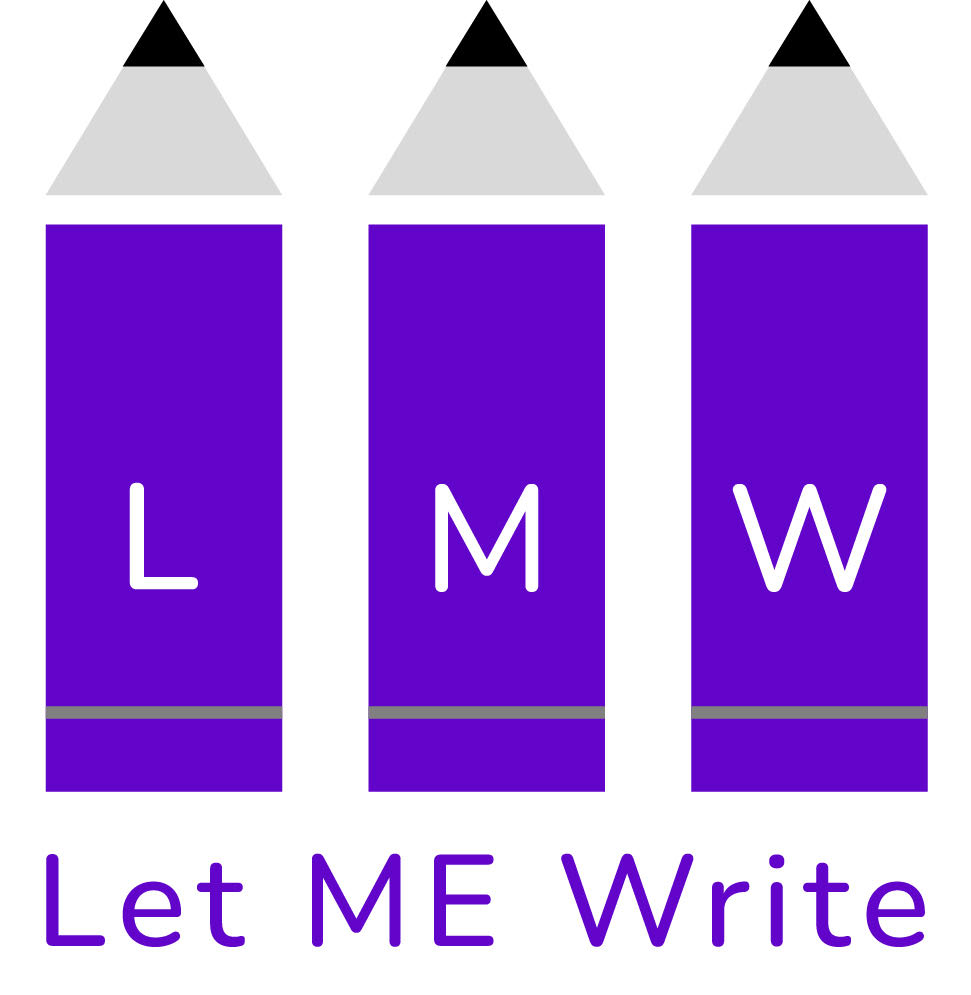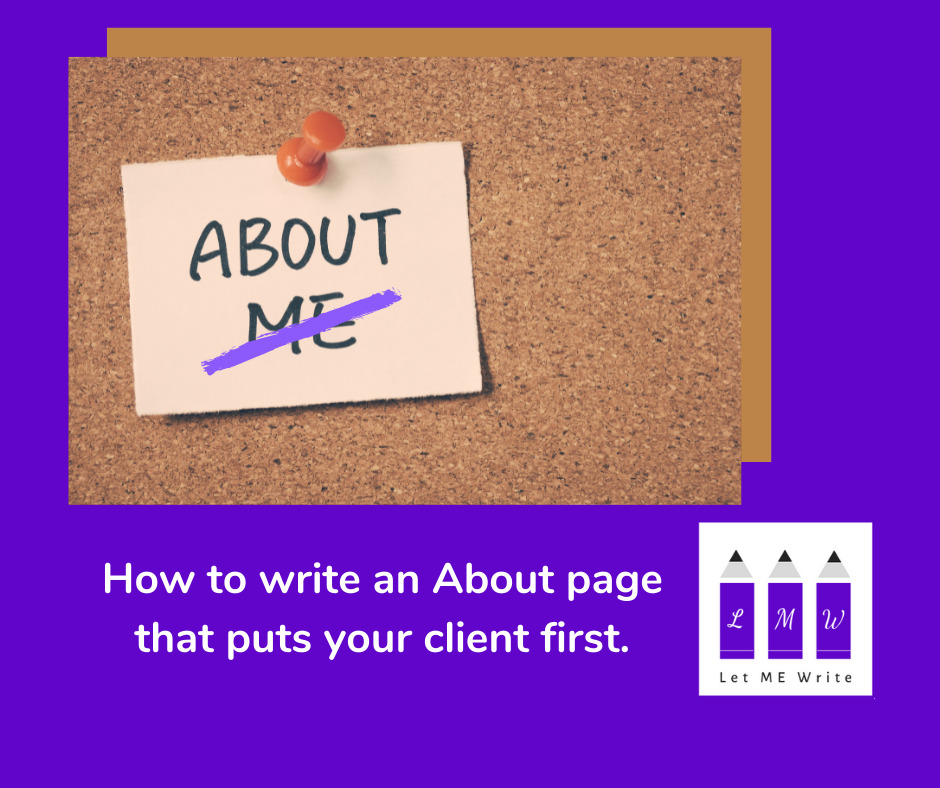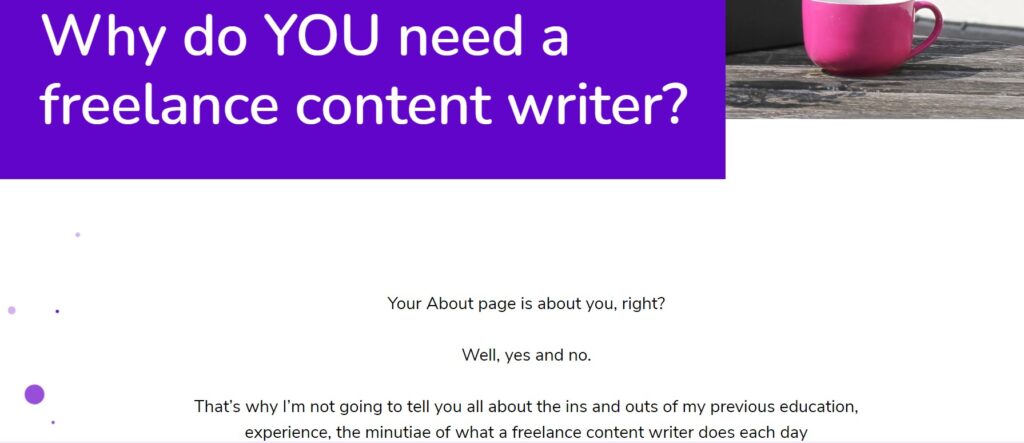Figuring out how to write an About page can be one of the trickiest parts of your website to get right. Even copywriters find writing about themselves difficult sometimes and there are some common mistakes you can make which turn your readers off rather than drawing them to you.
The biggest mistake you can make when you write an about page is to ONLY talk about yourself.
An about page that reads like an academic CV is not compelling and will have your readers bouncing off your page quicker than Tigger can say, ‘Tiggers don’t jump, they bounce.’
One of the most important pages for building relationships and authority is your about page. Notice that I don’t call it the ‘About Me’ page and I would suggest that you don’t title it that way either because if you are writing it correctly, it’s really not all about you.
So what IS important when it comes to how to write an about page?
It should be about your connection to your audience. It should paint a clear picture of WHAT you do to solve your customer’s pain points and crucially, HOW you do it.
The age-old (and yes, cliched phrase) ‘People buy from people’ is key– there is really no getting away from this fact. If you don’t connect on a personal level with your customer, you are going to have a much harder time closing the sale. This is especially true if you provide a service – people want to know, like, and trust those they do business with.
So, your About page needs to sell your products and services in the context of how you conduct yourself with others.
What could you include on your About page?
Have a think about the answers to the next set of questions and incorporate some of them into your About page:
- Who do you want to work with?
- Who is your dream customer? Describe them.
- What’s the purpose of your business, your why? What gets you turning up at your place of work each day?
- Where are you heading with your business, what’s your vision for the future?
- What is your mission with your business? What exactly do you do that helps you reach your business vision?
- How do you help people? What values are important to you?
- What’s the greatest benefit your client gets from working with you?
- What do you love most about what you do and why?
- What do your customers say about you?
So, now you’ve got some content ideas, it’s time to get writing but there are some fundamental pitfalls you need to dodge – here are 15 mistakes you don’t want to be making.
15 Mistakes you should avoid when you write an about page
-
It’s only about you
Ok, so I’ve said this already, but it’s so important, I’m saying it again. Your About page should not be ONLY about you. Sure, you should include some relevant details and even some fun random facts about you to show your personality (more about that in point 3) but you need to be writing your about page to explain to your potential clients WHY you are the person they need to be working with. So, write about your ideal clients and their issues/desires and how you solve their problems. A good rule of thumb is to use the word ‘you’ twice as much as you use ‘I/we’ -that way your copy will be client-centric and speak more directly to them.
-
It’s written in the third person
Write your About page in the first person – use I (or we, if you are a team) rather than using the third person which puts up a barrier between you and your reader.
3rd person – ‘Susan has 25 years’ experience in accountancy for small businesses.’
1st person – ‘I’ve (we’ve) been working with small businesses, helping them with their finances for a quarter of a century – yes, I (we) really am (are) that old!’
Using the 1st person immediately draws your client in and helps you express yourself in a much more compelling way, which leads me to mistake number 3.
-
It has no sense of your personality
If you overly sanitise your website and don’t allow your personality to shine through, how will your potential clients know that you are the right provider for them? Unless you provide a product or service that’s totally unique (and let’s face it, not many of us do) then you differentiate yourself from your competition simply by being YOU.
You are unique in the exact way that you provide your service, the way you interact with your clients, and the way you bring your own set of skills, knowledge, and competencies to solve your client’s pain points. If you don’t write with personality on your website, you will fade into a sea of all the other people in your industry, making it much harder for you to attract your ideal clients.
-
Your language is too formal or jargon-heavy
This is a very common error – people make the mistake of thinking that their website needs to be more ‘corporate’ – after all, it’s a business website, right?
Wrong!
Using corporate, management speak, jargon or platitudes will likely turn most clients off. If your copy is littered with phrases like
‘it should be noted that…’,
‘thus, the achievement was…’
‘we believe in blue-sky thinking’
‘we are the gold-standard in service’
you won’t be drawing people towards you, you’ll be putting them off. Write your about page using the language you would use if you were talking to a friend about your business. I’m not saying you should be unprofessional, use slang or profanity but you need to be letting your language reflect who you really are – professional yet personable is what you should aim for.
-
It’s not in your voice so it doesn’t sound authentic
This is similar but not quite the same as the above point. You can write informally and still not sound like you. If there is a disconnect between the language you use on your website and the language you use in your other communications, your client will notice. They may not be able to articulate why, but they will feel the mismatch and that will create tension, a barrier to working with you.
Consistency of communication is vital to build the trust your client needs in you. Be careful to make sure you write your About page using the words you would normally use when you are talking to your client face to face.
-
It reads like a CV
A long list of qualifications and accreditations is not great fodder for your About page.
Let’s be frank.
Your client doesn’t really care about any of that (for the most part, although there are some notable exceptions such as a brain surgeon and a rocket scientist – if you are thinking of working with one of them, you probably do want to check they are very well qualified).
Also, don’t give a blow-by-blow account of every job you’ve ever had.
YOUR CLIENT DOES NOT CARE.
Just pick out one or two relevant parts of your backstory to demonstrate how you can help them now. That’s enough. This brings me to mistake #6.
-
There’s not enough storytelling
People love stories. Stories are memorable and if you tell the right story, you can magnetise your ideal client to you. Take your client on a journey and make them the hero of that journey. Show (don’t tell) them exactly how life will be better by working with you. Storytelling can be tricky so if you find this difficult, it’s a good idea to get some help from a copywriter. Telling your backstory – how you came to be doing what you do will help your clients connect with you – just don’t overdo it. Make it relevant to the client and the client’s current issue.
-
You aren’t talking to one person
If you try to speak to everyone, you end up speaking to no-one. It’s an easy mistake to make when you start out in business. Marketing advice is usually to pick a niche as this makes it easier to talk to your ideal client. I don’t believe that it’s strictly true but if you find you aren’t getting new clients via your website, you should look at changing your copy so it speaks directly and clearly to one person. I promise you that using the word ‘you’ rather than ‘people’ or ‘they’ will help and having an image of your dream client in mind as you write will also help.
-
Your language doesn’t resonate with your ideal client
You might have a clearly defined client in mind but if the language you use doesn’t resonate with them, they won’t be taking the next step to work with you. A great way to find out how to align your language with your ideal client is to hang out online where your ideal client is hanging out and take notice of how they speak.
Let’s say you are an accountant and you particularly want to attract hospitality clients. Speak their language. Couch your offer in terms that they understand – use analogies that make sense to them. Perhaps you could even present your offer in the form of a menu of services – set menu or a la carte.
-
It’s stuffed with features and lacks benefits
It’s EASY to write about the WHAT of your service or product. We can see that everywhere. But don’t stop there – take your client on the journey, join the dots for them – even if you think you are stating the bleeding obvious!
Example: This 8 week course consists of 8 x 1 hour 121 sessions in a group format. You will learn everything you need to become a stellar direct response copywriter, including email marketing, long form sales pages, website copywriting and paid ads.
Does this pass the SO WHAT? test?
Nope, because you haven’t stated what the benefits are.
Put the benefits right in your client’s face where they can’t ignore them. If you don’t grab your client in the first 3 seconds of them landing on your page, chances are they will go ‘meh’ and bounce away to your competitor.
Always, always present the benefits in all your copy, including the About page.
In the example above, follow it up with WHY your course is the best one for them. If you can use social proof and hard facts to demonstrate the benefits, even better.
-
It’s overly long
Let’s face it – no one has time to read a War and Peace-sized About page. Keep it relevant and focused on your client, with a smattering of fun facts about you, a brief origin story – 500-700 words is probably sufficient to get all your salient points across.
-
There’s no photo of you
People can connect to you much more easily if they can see the face behind the brand, so make sure you have at least one professionally taken photo on your About page even if you don’t use photos of yourself on any other pages. The photo should represent how you usually look when working with your clients. If you usually wear jeans and a T-shirt, don’t use a photo of yourself in a suit on your website because it will be incongruous with the image you usually present. Make sure the photo shows you smiling and facing the camera directly so that you appear open and friendly to your potential clients.
-
There’s no call-to-action
Every page on your website has a specific purpose but they all also have the same purpose – drive your reader to take the next action. Whether that’s to book a call with you, download a freebie, buy a product or send an email, you want your reader to be left in no doubt what you want them to do next. Put at least 2 call to action buttons or links on your About page to encourage your client to make contact.
-
There are spelling errors
Grammar and punctuation are a bit of a moveable feast – when we are writing the about page the way we speak, then you can be a little flexible with your grammar and punctuation, especially if it helps you make a point that captivates your reader. However, spelling errors/typos are a no-no. Proofread your copy, then proofread it again, then have someone else proofread it. Spelling errors smack of a sloppy job and if you can’t be bothered to get your website right, what does that say about the job you might do for your client.
-
It’s woefully out of date
If your About page reads like it was written in 1923 rather than 2023, your clients will worry that you won’t take good care of them. Update your About pages every 6-12 months, add in new benefits, testimonials from more recent clients, and make sure that the language you are using is still current. No one likes to see a reference to Google+ on a page that’s talking about current marketing platforms – it devalues your site and reduces your credibility.
-
To use a template or not, that is the question…
You can download templates for just about everything these days, but does it make sense to follow a strict guide on how to write an About page?
If you find writing really tricky, then it can be really helpful to have a template to keep you on track, to make sure you cover all the points you need to, and avoid all the pitfalls. However, you still need to ensure you make your About page unique and consistent with your brand. If a template suggests something that doesn’t sit right with you, just don’t do it.
Here are some great About pages that use an authentic brand voice, focus on the customer pain points, and show that’s OK to show your personality. Some are quite short, others a bit longer – write enough to give your audience a reason to take the next step.
Dave Harland https://www.thewordman.co.uk/about/
Dave is a down-to-earth, no-messing, all-round word guru who tells brilliant stories. His about and story page cover all you need to know about why you should work with him.
Sarah Clay Social https://www.sarahclaysocial.com/about/
Sarah’s about page focuses on her love of LinkedIn and clearly explains the value her clients can get when they work with her. The layout is clear and the message is simple.
Kate Mellor https://www.katemellorva.co.uk
Kate’s About page is extremely easy to follow enabling you to easily find what you need. It speaks directly to her reader’s pain points.
Bloom & Wild https://www.bloomandwild.com/about-us
This About page is so on brand – they make you care with their language. Why wouldn’t you buy?
Still stuck for ideas for your About page?
You could use the answers to some of these questions to help you figure out how to write an about page and build in some of your personality.
- What’s the strangest thing that’s happened to you at work?
- If you could only watch one film and read one book for the rest of your life, what would they be?
- Who do you admire most in your industry and why?
- What makes you, you? What’s your USP?
- If you were an ice cream flavour, what would you be?
- Where’s the one place on the planet you’d love to visit and why?
- If you could choose one superpower, what would it be?
- What one food could you not imagine living without?
- What was your favourite thing to do as a child?
- What do you love doing even though you absolutely suck at it?
- Which one person, dead or alive, would like to spend an hour with and why?
- What was your favourite subject at school and do you still love it now?
- If you could be a fly-on-a-wall for a day, where would you land?
- What did you do that has made you most proud?
- Which music influenced you most as a child?
How to write an About page – a quick format to get you going.
- Title
- Customer Pain Points
- Call to Action
- Benefits of your service
- Who you are and how you work – short personal bio
- Call to Action
If you’re still sitting with a blank screen or page in front of you after reading all of this, don’t despair. Help is here.
I love writing about other people – so much easier than writing about yourself, so if you want to pass this over to someone who has written dozens of About/profile pages for small business owners, let’s chat and get what’s in your head knocked into shape so you can have an About page that’s spot on for you.
Contact me using my form or email michelle@eshkeri.co.uk
Perhaps you are interested in figuring out how to write SEO content for your website – why not check out my blog post.



